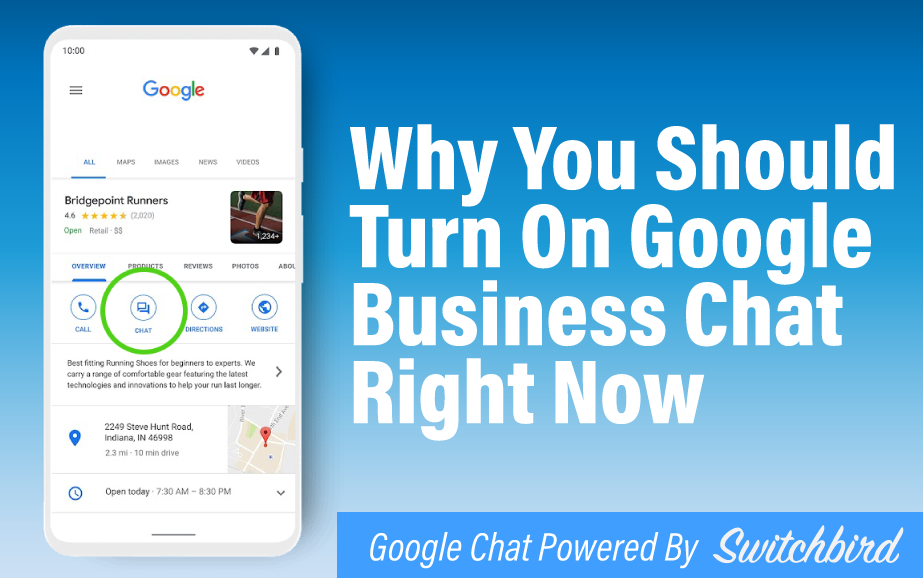
If you’re a marketer or business owner, Google Business Messages (GBM) is probably already on your radar.
Are you a nay-sayer? I mean, I’m sure you didn’t ask for “yet another customer communication channel.”
Still, I think this one is different primarily because, well, it’s tied to your business presence on Google.
I’ve argued elsewhere that Google’s new suite of products like Business Messages and Call History are the future of business rank and reputation in search. After all, they provide Google virtually unspammable insight into how your business operates.
But even if you don’t buy my prediction, there are some obvious tactical gains to be had for businesses that enable GBM now–before your competitors are any the wiser.
Google Business Messages is Win-Win for Consumers and Businesses
Turning on Google Business Messages for your Google Business Profile puts a “Chat” call-to-action (next to the “Call” call-to-action) in Google’s organic search results for your business.
Business Messages–or what I call “business chat” in advance of its inevitable name change 😛–follows the trendline of Google facilitating (and also insinuating itself into) transactions by allowing brands and business owners to enable industry-specific CTAs, such as for booking an appointment or requesting a quote.

But “chat” is a more versatile, lower-friction option that Google has researched and tested extensively. And chat for Google means asynchronous chat as opposed to live chat. The benefits of asynchonous chat to both businesses and consumers are substantial.
For consumers, the benefits are readily apparent:
- Convenience: Imagine needing to retain a lawyer but because you’re doing the search from work or after-hours or with kids in tow, you can’t pick-up the phone and call. The field of firms you consider may quickly narrow to those who offer the “chat” option.
- Immediacy: Even in the absence of either a live agent or any chatbot/virtual assistant, Google business chat allows the consumer to start the conversation immediately, on their schedule. Like a contact form but without the friction of going to your website, finding it, filling out the info and submitting it to what many of us now expect is a black hole.
- Suitability: Consumers will find a business at different stages in their customer journey. Let’s say I just started researching local electrical contractors to see who might be able to help with a wiring upgrade to my home. But I simply want to identify contractors who are also familiar with networking equipment. I’m not prepared to request a quote. I am prepared (and, in fact, need) to chat!
For businesses, there are significant benefits, too:
- Lead capture Google business chat puts a high-visibility, low-friction call-to-action as early in your sales and marketing funnel as possible (right in the SERPs!) and makes it available 24/7. While you could argue that the contact form on your website serves that purpose just fine, it requires considerably more from your customer. Arguably, you are losing leads who never make it that far or don’t trust that they’ll ever see an answer from your contact form.
- Efficiency Even without automating it, asynchronous messaging is vastly more efficient to manage than live phone calls. Add to that efficiency a tool like Switchbird to funnel contacts automatically through common customer pathways and arm your staff with commonly used messaging or message sequences for reuse, and you have a huge operational win in migrating calls to messages.
- Performance Google collects ongoing customer feedback in the form of customer satisfaction scores after every interaction in Google Business Messages. In the future, we expect Google to use the data from messaging and call tracking to rank businesses in search: as it provides “signal” against the noise of spammable sources like profile content or reviews.
To reap these benefits, tools like Switchbird make it extremely easy to turn on Google business chat, partially automate it, and perform in the channel in ways that delight customers. We also enable you to hit 100% responsiveness scores and give you control over the delivery of Google’s CSAT surveys to optimize those, as well.
But if Google business chat creates a win-win-win for consumers and businesses and Google, why aren’t more brands and business owners using it?
GBM’s Lack of Adoption Is an Opportunity for Early Adopters
GBM is a relatively recent addition to Google’s product suite for brands and business owners. The earliest murmurs about it emerged from the Googleplex in 2019, and as of this writing, some version of Google Business Messages has been live for about two years.
Among all of Google’s business-oriented products in the Google Business Profile (formerly Google My Business) suite, Business Messages is still ignored by a majority brands and business owners.
The reasons are multiple:
- The product is hard to setup and work with in any but the most rudimentary ways. Most businesses will rely on a Google Partner like Switchbird to provide the missing tools for Google Business Messages.
- In true Google fashion, the product has already moved once. GBM began life in the Google My Business app but was migrated to Google Maps in early 2022. If you’re disoriented already, you’re no alone.
- The powerful “chat” call-to-action discussed above still shows in only a handful of contexts within Google Search and Maps.
In Google search results, chat shows up as an option in the knowledge panel (so, for branded queries) on mobile and in the placesheet listing of any profile with GBM turned on, but only on Android devices. The chat option does appear cross-platform on Google Maps listings, but the Maps app accounts for only a small fraction of search queries.
The unavailability of chat in SERPS on desktops and iOS–and so a majority of searches–means that:
- Few consumers and businesses encounter Google business chat “in the wild” and therefore know little about it
- Google business chat nets only a fraction of new leads compared with all search traffic for a brand
Brands and business owners who don’t already use a tool like Switchbird, then, may dismiss GBM as not worth the effort of turning on and managing yet another messaging channel.
Local Businesses Who Turn on GBM Gain Immediate Competitive Advantage
Despite the seemingly small stakes, local brands and business owners who bet on Google Business Messages gain an immediate advantage over their competitors who don’t. Case in point:
Imagine I’m searching for a “real estate lawyer near me” from my Android phone in one of those research scenarios mentioned above: maybe I’m at work, or it’s after-hours, or I have kids in tow.

My search brings up a “placesheet” listing all of the local law firms in the “real estate” category–easily dozens in most markets. But the options are hardly differentiated at this stage. Rank and review stars are guideposts, but increasingly every business has a 5-star reputation.
The available calls-to-action are a potent differentiator here, especially when we think contextually. At whatever stage of the customer journey I’m in, I want to know that whomever I choose to do business with is responsive, available and convenient to work with. Seeing that I can chat with them here right away gives them a leg up.
It also may make them one of my only clickable options. After all, I want to start the conversation. I need to get the ball rolling. But I can’t call: I’m at work, or it’s after-hours, or I have kids in tow!
Local businesses who turn on chat are winning customers like me every day over their competitors, simply by enabling Google Business Messages.
A Small Bet on GBM Now Can Bring Big Returns Down the Road
Whenever talking about leads to our business from Google search, we have to recognize that what is a trickle today could well become a firehose in the future. I mean, Google processes something like 5.6 billion searches per day. To dismiss GBM as “low-volume” or otherwise unimportant would be to miss both the immediate and long-term “skate-to-where-the-puck-is-going” opportunity.
And if I and others are right that your use of and performance in Google Business Messages will also become a ranking factor as Google (and people in general) lose trust in other data, the brands and business owners who embrace these early opportunities will outperform in the future and win the day.
